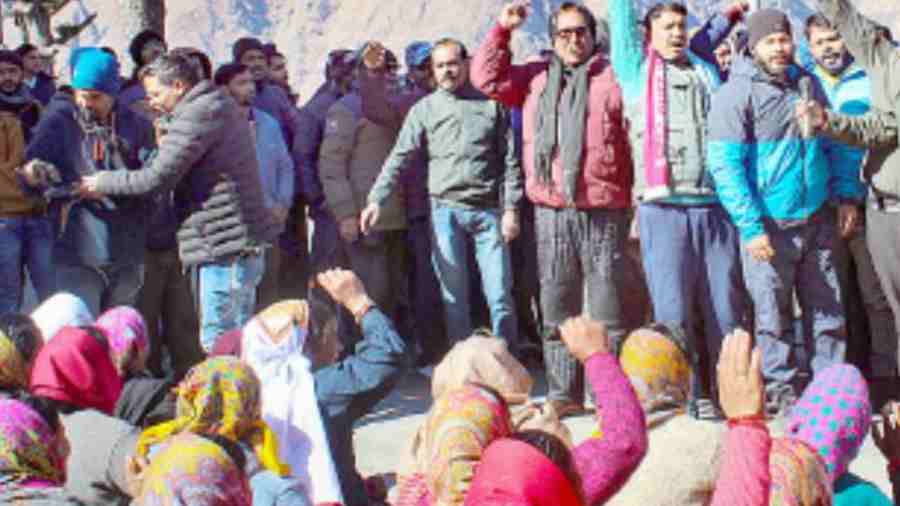With their shelter home in sinking Joshimath turning freezing cold at night, Rajeshwari Devi’s family had held a small protest demanding the Uttarakhand government speed up its rehabilitation plan so they could shift to a better place.
The government sent a room heater in reply, but gave no indication when the compensation for the damage to the family’s houses would be paid, enabling them to buy new homes outside the subsidence zone.
“The government’s delay tactics may force us to take the path of a bigger agitation,” Rajeshwari Devi said.
Three weeks after cracks started appearing in buildings and roads in Joshimath, prompting the administration to move scores of families into makeshift shelters, the residents’ patience is wearing thin at the government’s failure to even announce a timetable for compensation.
Visheswari Devi, a member of one of the affected families, said: “We have failed to get the government to hear our complaints because we are following the peaceful path of the dharna. But 21 days have passed since the problem started. We hope the government will not test our patience any more.”
Rajeshwari Devi said she was staying in a community hall with 29 members of her joint family after their three houses developed cracks.
“The government shifted us from our houses to the shelter home on January 3. It has been snowing every day for the last four days and the temperature is between zero and four degrees Celsius,” she said.
“When we held a dharna to get the compensation or rehabilitation plan speeded up, officials sent us a room heater for the huge hall. Obviously, the government is in no hurry to give us relief.”
Over a dozen residents have been on a roadside dharna at the entrance to Joshimath since January 6 to pressure the government into speeding up the process of compensation and rehabilitation.
With 20 more houses and 6 shops affected in the last 24 hours, Joshimath’s count of buildings with cracks reached 870 on Monday. The local administration has identified 181 buildings as completely unsafe to live in. The fissures in the roads are widening by the day. Eight roads have sunk partially.
Chief minister Pushkar Singh Dhami has said that experts are going from building to building, studying the damage, and that this process has to be completed before the compensation for each family can be determined.
Dinesh Lal of Singhdhar, whose house collapsed on Sunday evening, 19 days after two of its walls developed cracks on January 3, said: “Experts and teams from the central and state governments can be seen inspecting our town every day but no action plan has been announced yet. This shows the government is not bothered about our future.”
Lal has taken shelter with his family in a primary school on the town’s outskirts.
Himanshu Khurana, district magistrate of Chamoli, said: “The survey is going on and the rehabilitation plan will be announced soon.”
Joshimath residents blame the government also for failing to heed scientists’ warnings over the years about a catastrophe if construction and development projects went on unchecked --- and for allegedly trying to deflect blame now.
The government and the NTPC have both said the land subsidence has nothing to do with the central public sector undertaking’s under-construction power project and tunnel in the area.
A government statement, drawn up on the basis of a National Water Science Institute report, said on Monday that the quality of the water seeping out of the ground in JP Colony since January 2 is different from that of the water in the NTPC tunnel.
Rajeshwari Devi said: “The crisis is manmade. Government-run projects are behind the landslides and the subsequent sinking of Joshimath. Many experts have confirmed this but the government and the NTPC are unwilling to accept the truth.”










